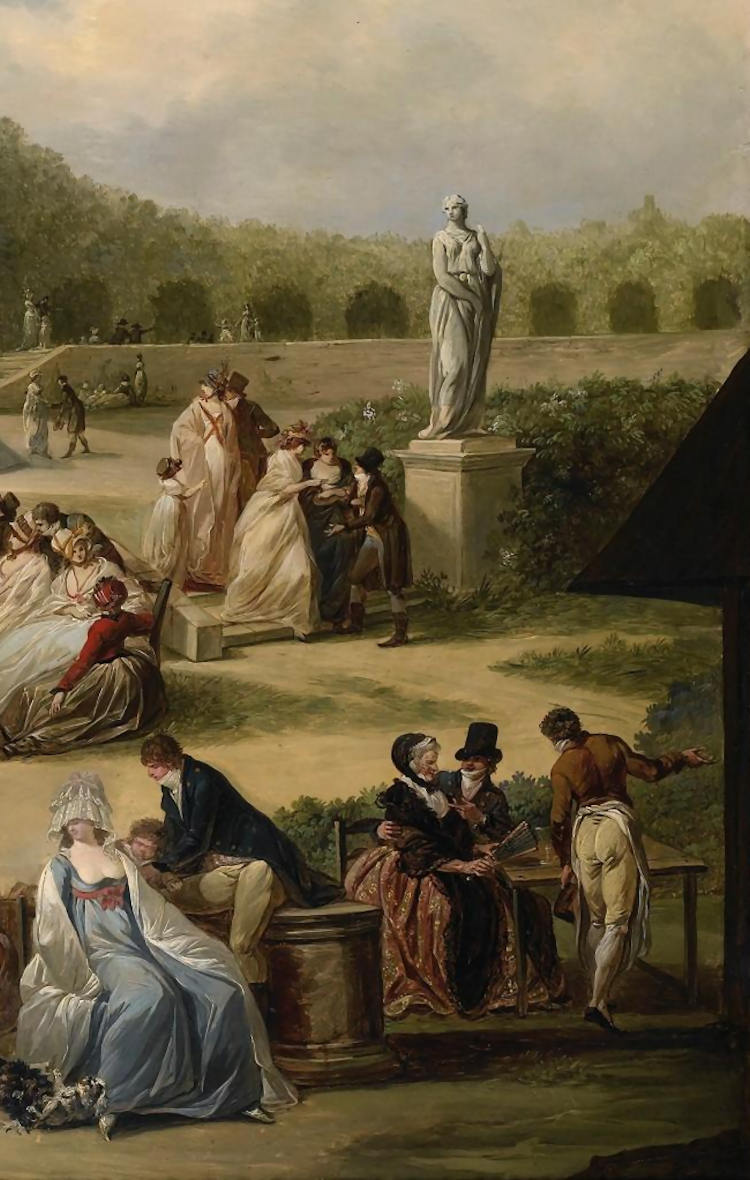 |
| Une fête au Colisée, circa 1789. |
Le Colisée was a sort of guinguette - a suburban drinking establishment, usually open-air, with food and, often, dancing - but, in this case, reserved for "better society". The glamorous setting - manicured lawns and flowering bosquets, fountains, pavilions and ballrooms - brought an immediate success to its proprietors. But it was all short-lived. Established in 1787, it was demolished in 1792, its location necessary in the reinforcement of the city's defenses against the threat of the Austrian army. Besides being a testament to a particular time in history, this painting is also a particularly rich record of the fashions of the day.
 |
| Several of the privileged gentlemen here look to have tricolor cockades in their hats, a sign that the Revolution has already begun... |
 |
| ... though the coming horrors are not yet imagined, are still nothing to trouble this over-dressed fête galante. |
*
 |
| Le Bal de Tivoli, Paris, 1799. |
The Tivoli Gardens were three Parisian amusement parks established, in succession, between 1795 and 1842 and named after the gardens of the Villa d'Este in Tivoli near Rome. In 1766, Simon-Gabriel Boutin, son of a wealthy fermier général, had several houses built in a twenty-acre park on the west side of the rue de Clichy, a park resplendent with rare plants, English, Italian, and Dutch gardens, a bowling green, and follies including false ruins, rochers, and a waterfall. He named the ensemble Tivoli in honor of the gardens of the Villa d'Este in Rome, and the Folie-Boutin, as it was often called, quickly became known for its remarkable gardens. Boutin was guillotined on 17 July 1794, during the Reign of Terror, and his park put under sequestration. The following year the Folie-Boutin opened to the public, formally taking the name of Le Grand Tivoli and becoming the ancestor of amusement parks. During its time as a public garden, it was a favorite entertainment spot for fashionable Parisian society - the infamous "fashion victims", the Incroyables and Merveilleuses, were much in attendance - with amusements including panoramas, marionettes, and magic lantern shows. From 1796-1797 a counter-revolutionary society occupied the site, but Boutin's heirs recovered Tivoli by a lawsuit in 1797. In 1799, a bath - Les eaux thermales et minérales de Tivoli - opened on the grounds. But following the damage caused by the bivouacking of Napoléon's troops before their departure for Spain, the garden was closed on August 30, 1810. The second Tivoli opened almost immediately across the street, on the east side of the rue de Clichy.
***
François-Louis-Joseph Watteau (18 August 1758, Valenciennes – 1 December 1823, Lille), French painter known, like his father, as Watteau de Lille. He was the son of the painter Louis-Joseph Watteau and grandnephew of the famous Jean-Antoine Watteau. Like his great-uncle, he painted scènes galantes, but also military subjects and portraits. His genre scenes as well as his drawings and engravings of high fashion brought him some degree of success in pre- and post-Revolution Paris. From 1808 until his death he was deputy curator of the Palais des Beaux-Arts de Lille, which his father had helped to found.






This comment has been removed by the author.
ReplyDelete"Blogspot"? I'm not entirely clear about the difference between Blogger and Blogspot. But I only post things here on my Blogger site. Glad you enjoy it - thanks!
Deleteyes they are both the same i think..
ReplyDeleteit's hard to find new bloggers
lovely site you have.
reading The idiot of Dostoievski at the momet.
interested in music and making drawings, photography,
we like it all so i hope; you'll check it on my blog too.
see you in the future and thanks.
happy weekend.